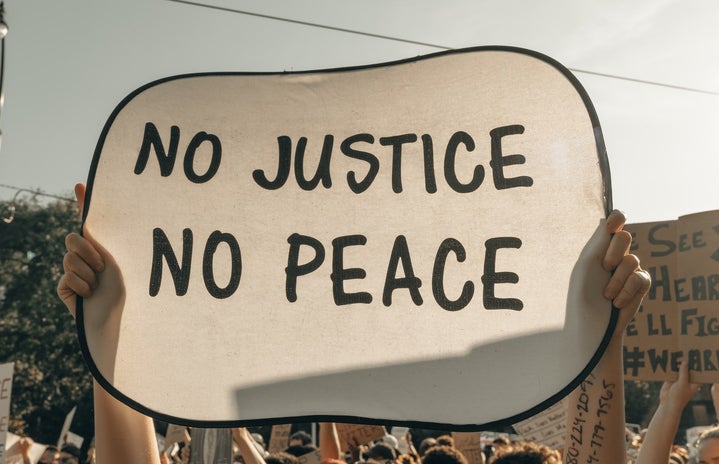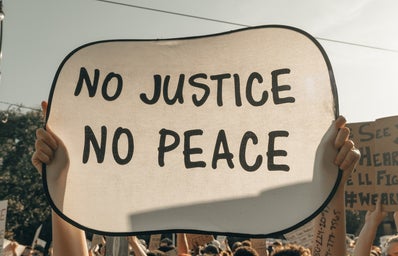It’s easy for me to only see the good in Jordan because I no longer live there. It’s easy for me to listen to how lavish and enjoyable my family’s accounts of their lives are and assume that everybody in Jordan has it just as good because I no longer live there. It’s easy for me to listen to my mom tell me about her daily walks and her outings with her friends and assume that every woman in Jordan feels just as safe because I no longer live there. It’s easy for me to compartmentalize and think that the entirety of the Jordanian community is loving and accepting because I used to live in a nicer neighborhood where everybody was relatively more open-minded and accepting, but that illusion is quickly shattered whenever I go on social media.
On the evening of Friday, July 17, 2020, eyewitnesses saw Ahlam, a woman in her early 40’s, get killed in cold blood by her father in Jordan. He drank tea and smoked a cigarette next to her body after he killed her, taking pride in what he had done. Neighbors heard Ahlam’s cries and saw her father chase her outside her house as she ran away with blood covering her body, and then saw her father beat her on the head with a cinder block until she passed away. Before Ahlam died, she begged her mother for help, but to no avail. Her mother remained silent, unable to speak out against this man’s animalistic behaviors.
Her father claims that he killed her to preserve the family’s honor. Jordan’s biggest problem is “family honor.” Women are victims of domestic violence and honor crimes at an astronomical rate. Although Islam never grants anyone the right to kill women on any basis, people still use it as a scapegoat to justify their actions. Ahlam’s death wasn’t an isolated incident. In fact, nine women have been killed in Jordan under the guise of an honor crime since the start of 2020, and those are the cases that we know for sure. Many women’s deaths go by unnamed and the perpetrator faces no repercussions because of this rampant mindset that excuses murder when it’s in the name of preserving the family’s honor.
The root of the problem in those certain communities is patriarchy. Misogynists view women as their property, and they believe that women shouldn’t be allowed to live their own lives and make their own decisions. While the MENA has a plethora of intellectual societies and educated people, there is still a large percentage of people that live in the dark ages where women aren’t allowed to get an education, provide for themselves, or freely express themselves. Another problem is that more often than not, these men see a woman’s actions as a reflection of themselves and their “honor”; as if the woman is an extension of them. So, when they see a woman’s actions as wrong or if they think that she had done something that is bringing shame to their family’s name, they resort to domestic abuse and killings in the name of honor. Ludicrously, the actions that some women have been killed over could be simply owning a social media account or getting raped by a man then having to pay the price for it.

Now, it is unreasonable to pinpoint the blame on one person or governing body. The inability to reduce those killings lies in the faults both the society AND the government. There is a lot of complicity from within the societies themselves because people choose to remain silent or turn a blind eye since it doesn’t directly affect them. It also needs to be taken into account that people within those communities that practice killing in the name of honor don’t necessarily see anything wrong with it. Many men, and even women, defend the right to preserve a man’s honor and actually preach killing in the name of honor or resorting to domestic violence because they believe that a woman should just abide by whatever her husband and/or family tells her to do. So, it comes from a lack of genuine understanding that women do deserve their own rights, and from the complacency of other communities within those countries that don’t necessarily experience the issues at hand. Basically, some communities are more progressive than others within the same country; and its members sometimes believe that those problems aren’t ones to concern oneself with.
Notwithstanding the progressive nature of the democratic governments, there are still penal codes that in one way or another, allowing those criminals to go by almost unscathed. Just one example would be article 98 of the penal code of Jordan. Loosely put, this article translates as, “He who commits a crime in a fit of fury caused by an unlawful or dangerous act on the part of the victim benefits from a reduction of penalty”. Basically, this grants the perpetrator a lesser sentence because they deemed the act dangerous or unlawful. This is widely misinterpreted by most perpetrators and used to their advantage because they usually use this to excuse their murders; and the victims could’ve been doing something as simple as texting a male friend or owning a social media account.
In order to prevent those murders from occurring, fundamental change to the society and government needs to happen. The penal codes that excuse these perpetrators need to abolished and we KNOW that it’s doable. According to the USAID website, article 308 of the Jordan Penal Code allowed perpetrators of sexual assault to escape punishment if they married their victims. The Sisterhood is Global Institute Jordan lead a coalition of 120 local organizations in local and national advocacy against the article, resulting in its abolishment in 2017. So, whether it is doable or not to alter those codes is definitely certain, and the answer is yes; it’s doable.
Additionally, programs need to be put in place to ensure that women remain in school and get their rightful education. Ahlam, the woman that was murdered last Friday, was taken out of school during her fourth-grade year by her parents in order to do house chores. So, there need to be better methods of data collection and databases to ensure that everyone is receiving the education that is rightfully theirs. Also, there needs to be some sort of vocational training programs and resources for women that are still being marginalized and left out of the workforce. Jordan ranked 140 out of 145 countries on the Global Gender Gap index in the year 2016. This is Jordan’s worst ranking since the index began in 2006. Women’s economic marginalization in Jordan has worsened dramatically over the past decade and has been a key factor in the country’s awful track record on women’s rights more generally. Jordan’s specific score on economic participation and opportunity for women tumbled 28 percent on the Global Gender Gap Index between 2008 and 2015.
Finally, there need to be resources for women that are suffering from domestic violence. There need to be governmentally funded shelters that can house women for whatever number of months they need, until they are ensured that they have a safe place to live and a consistent source of income. This ensures that women have someplace to flee, and not have to depend on their abusive families or husbands.
Honor crimes MUST be criminalized. There shouldn’t be a caveat that allows the perpetrators some sort of immunity. Additionally, the term “wasta” must be ABOLISHED. Wasta loosely translates to knowing somebody that knows somebody that can help you get off the hook for whatever you’ve done. In Arab culture, wasta allows people to get jobs they aren’t necessarily qualified for, get into offices they aren’t fit for, or just get something their way because they know somebody that knows somebody that can influence the decision-maker in the situation. This should no longer be allowed to fly in legal situations, and perpetrators must start paying the price for their crimes.
Now, we realize that changing the penal codes and influencing an entire society cannot be done overnight. However, as a grassroots society, we have been making a tremendous effort to bring attention to the issue. So far, a group of about 50 women and I have started social media campaigns that address both killings in the name of honor and general infringement on women’s rights in Jordan. We have successfully gotten two hashtags to trend in Jordan and have engaged with multiple demographics of people, explaining and educating as we go.

These campaigns also led to a plethora of Twitter and Instagram users to engage with the graphics made for our campaign, reposting them and bringing attention to the cause.

We are going to continue attracting attention to our cause. We believe that by globalizing the issue and addressing it to a wide-scale audience, we will be able to create more momentum and gather a large enough base of people that would be willing to further push for social change when needed. A feminist coalition in-the-works and I will be sitting down to strategize an official step-by-step plan on what to do next, and that plan will include our list of demands that we will use to pressure local politicians and policymakers to engage with and hopefully, eventually, achieve.
Links to Ahlam’s case:
Links to other cases of killing in the name of honor:
General Recourses to help educate on the topic:
Want to see more HCFSU? Be sure to like us on Facebook and follow us on Instagram, Twitter and Pinterest!



